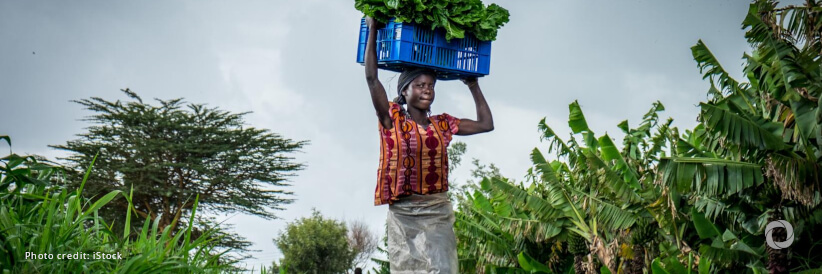The Food and Agriculture Organization of the United Nations (FAO) and the International Fund for Agricultural Development (IFAD) launched a new program, aimed at strengthening efforts to transform global agrifood systems – from farm to table – so that they are sustainable, natural positive, resilient, inclusive and pollution-free.
Funded by the Global Environment Facility (GEF), the Food Systems Integrated Program (FSIP) was launched on Agrifood System Day at the 16th Conference of the Parties of the United Nations Convention to Combat Desertification (UNCCD COP16) in Riyadh, Saudi Arabia.
“Agrifood systems hold the solutions to major interlinked challenges to people and the planet. The Global Biodiversity Framework, the Paris Agreement, and the SDGs are unattainable without agrifood systems transformation. The Food Systems Integrated program offers the opportunity to put agrifood solutions into action and channels investments towards scalable results. FAO is committed to working with Members, farmers, producers, consumers, and partners, including the private sector, and across sectors, to transform global agrifood systems to be more efficient, inclusive, resilient, and sustainable for the Four Betters: better production, better nutrition, a better environment, and a better life – leaving no one behind,” QU Dongyu, Director-General of the Food and Agriculture Organization.
The program will channel US $282 million in GEF financing and an estimated US $1.8 billion of co-financing towards global environmental benefits for biodiversity, land, and climate change, along with socioeconomic benefits of improved food security, nutrition, and livelihoods.
The program targets agrifood systems of four sectors – crops (maize, rice, and wheat), commodities (cocoa, palm oil, and soy), livestock, and aquaculture – across 32 countries: Angola, Argentina, Benin, Bhutan, Burkina Faso, Chad, Chile, China, Costa Rica, Ecuador, Eswatini, Ethiopia, Ghana, Grenada, India, Indonesia, Kazakhstan, Kenya, Malaysia, Mexico, Namibia, Nauru, Nigeria, Pakistan, Peru, Philippines, Solomon Islands, South Africa, Sri Lanka, Tanzania, Türkiye, and Uganda.
“The Food Systems Integrated Program is a transformative initiative to make food systems more sustainable and resilient, and to ensure that small-scale farmers can continue to produce one-third of the world’s food even through the uncertainty of climate change,” Alvaro Lario, President of the International Fund for Agricultural Development.
Countries and communities will develop and strengthen policies, value chains, practices, and investment plans for key agrifood sectors through the program. The program aims to mitigate methane emissions in the livestock and rice sectors, as well as deforestation in the livestock and palm oil sectors. The program will promote aquaculture as an alternative source of protein and income and integrated landscape management as an alternative to unsustainable land use in producing wheat and maize. In addition, it will also support sustainable practices for key commodities to ensure long-term environmental and economic benefits.
The program comes amid growing international attention to the key role of food and agriculture systems at the recent UN environmental Conferences of the Parties (COPs) for three different conventions. These include the launch of the Agri-NBSAPs Initiative at the CBD COP16 for biodiversity, and the Harmoniya Initiative launched at the UNFCCC COP29 for climate. All three COPs have prominently featured discussions on financing – agrifood systems accounted for less than 5% of total global climate finance (2019/2020) and 23 percent of the total climate-related development finance (2022), a decline from 37% in the previous decade.
The Food Systems Integrated Program builds upon nearly a decade of GEF investments in global programs on food systems, including The Good Growth Partnership, Resilient Food Systems, and the Food Systems, Land Use, and Restoration Impact Program. Approved and designed after the UN Food Systems Summit, the FSIP program will support countries to meet commitments for the Kunming-Montreal Global Biodiversity Framework, the Paris Agreement on climate change, and Land Degradation Neutrality.
“Global agri-food systems are crucial for health, food security, nutrition, and economic prosperity but also cause deforestation, biodiversity loss, land degradation, and greenhouse gas emissions. As our challenges are interconnected, they require integrated solutions. Through the Food System Integrated Program and other initiatives, the GEF plays a pivotal role in creating a sustainable food system — ensuring sustainability from production to consumption, generating agricultural commodities without deforestation, rejuvenating soils and degraded landscapes, and reducing negative externalities,” Carlos Manuel Rodríguez, CEO and Chairperson, Global Environment Facility.
The Global Coordination Project will support the design and launch of 32 country projects over the next 12 months. Global coordination hubs on policy and governance, private sector and investment, landscape-level – farmland, agroforestry sites, and other non-protected areas – innovation, and knowledge management will build communities of practice and enhance coordination throughout the program to generate greater impact than the sum of individual country projects.

